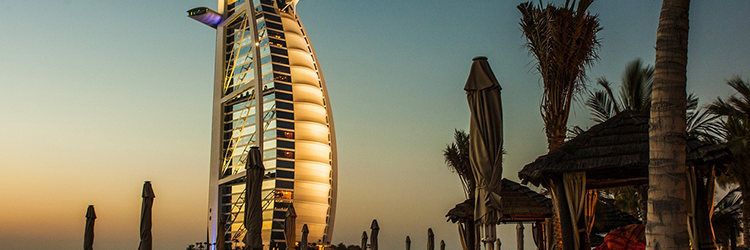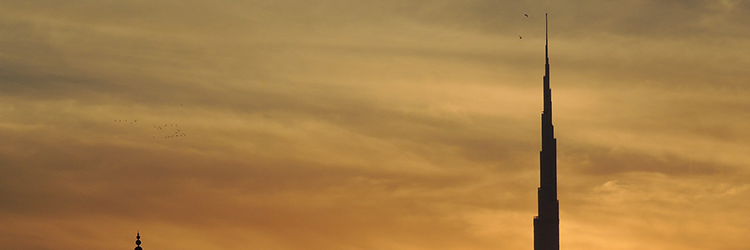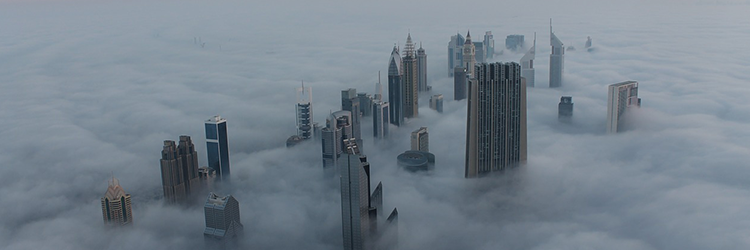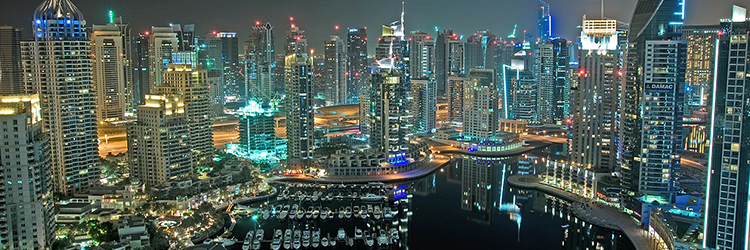July 16, 2015
By Wolfestone
In
The United Arab Emirates struck liquid gold in the form of oil and are now the seventh-largest reserve in the world. The country was established in December 1971 as a federation of seven Emirates: Abu Dhabi (capital), Dubai (largest city), Ajman, Fujairah, Ras al-Khaimah, Sharjah and Umm al-Quwain. The main two cities, Abu Dhabi and Dubai, used this money wisely. They invested directly into healthcare, infrastructure and education. Dubai especially focused on becoming a hub of international trade and transport with a diverse population of expats, large companies and, obviously, magnificent architecture. Dubai has re-invented many things: luxury holidays with seven-star hotels, the world’s tallest building, featured in large films like this year’s record-breaking Furious 7 and many more illustrations of success.

The growth of Dubai specifically is frighteningly impressive with several satellite timelapses available. As the city grew, it attracted business from all around the world and inspired the creation of hundreds of successful businesses too: Jumeirah Group started in Dubai and is now operating in China, Italy, the United Kingdom and more; The Emirates Groups has over 84,000 employees and is owned by the government; and Emaar Properties, the company that built the Burj Khalifa, have an annual revenue of over $3.3bn. The country itself recognises that business could be gained or lost in translation.

In the cities themselves, there are dedicated hubs to each industry – Media City, Industrial City etc. They quickly picked up businesses that act as dedicated Silicon Valleys of industries to make them easy to access and so that they can keep a little eye on the competition who are across the road. Presumably. Probably not. What is interesting about these hubs is that they now seem to be the future of business. Dedicated zones of industry are becoming more common as demonstrated recently.
The success is no surprise. All you have to look at is Hollywood. For decades, that has been the go-to place for American films. By putting all its potential in one place, all the eggs in one basket so-to-speak, it draws the correct attention and workers to it. Instead of companies being dotted around the place, you have a centralised peak of potential where the talented will flock in their droves to become a part of the beating heart of industry.
What has been a vital part of these successes is their relaxation of religious laws. Although they are still an Islamic country which holds values – kissing in public is illegal, alcohol is only sold in licensed areas which are mainly hotels, dressing modestly is encouraged – they are more lenient for tourists and expats, respectively.

As is the norm, you must respect one’s culture when travelling or moving to their country. That courtesy expands from the UAE with Dubai and Abu Dhabi especially. These cities do not impose certain rules in hotels or resorts. These have their own rules that allows the tourists to soak up the gorgeous sun and get a tan. The malls in Dubai are fairly lenient considering the religious rules and although dressing inappropriately is criminalised, it is rare that action is taken up legally, you will be asked to cover-up or vacate the premises.
Due to these law-changes that are more Western-friendly, shall we say, the country has become much more multicultural. The official languages of Dubai are Arabic and English. The figures for population diversity currently available do not really go too much in detail, but they do reveal that only 16.6% of the UAE are Emiratis, the official citizenship of the nation. The detail that the figures do go into are as follows: 23% other Arabs, 42.3% South Asian, 12.1% other Asian and 6.0% other expatriates. Population ethnicity figures are more focused for Dubai and it is clear to see a dynamic, multicultural civilisation is blooming in the role-model city: 53% Indian, 17% Emirati, 13.3% Pakistani, 7.5% Bangladeshi, 2.5% Filipino, 1.5% Sri Lankan, 0.3% American and 5.7% other countries.
Although it is difficult to discuss the other Emirates in the UAE, they are bound to expand due to their neighbours’ growth. Companies will want to be near the dynamic cities while possibly saving money on office space by sitting in a neighbouring Emirate.

Regardless, the main takeaway from Dubai is its diversity that has seen it grow an extraordinary amount since the ‘90s. All that diversity means there are possible communication errors which is why translation is essential in the mulitcutural, multilingual country. The dynamism of Dubai means it is the place to be as everything is built quickly and efficiently. The infrastructure is in place to sustain giant network connections and huge buildings of several different businesses. The growth of the country itself shows that the future of civilisation is from globalised cities like Dubai and Abu Dhabi. Ones that sustain their own culture while embracing everyone else’s to create a new home that reflects the internet generation of a one-stop shop that is as fast as the internet’s revolution.
For more information about Wolfestone services:
Document translation services, Localisation services, Transcreation services, Multilingual SEO services, Proofreading, Voiceover services, Interpreting services, Multimedia services, Legal translation services, Other types of translation
The professional translation services you can trust!
Information Correct: 16/07/2015
